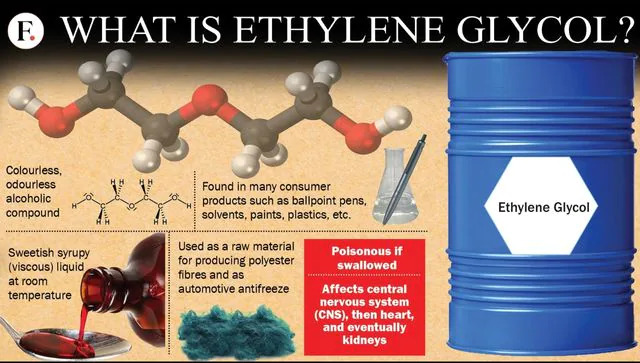ForumIAS announcing GS Foundation Program for UPSC CSE 2025-26 from 19 April. Click Here for more information.
ForumIAS Answer Writing Focus Group (AWFG) for Mains 2024 commencing from 24th June 2024. The Entrance Test for the program will be held on 28th April 2024 at 9 AM. To know more about the program visit: https://forumias.com/blog/awfg2024
Contents
Source: The post is based on the article “Uzbekistan says 18 children die due to cough syrup made by an Indian firm; blame it on ethylene glycol” published in TOI on 30th December 2022
What is the News?
India has sought a casualty status report after Uzbekistan claimed that at least 18 children died after consuming India-made cough syrup,
Uzbekistan has said that the syrup had the contaminant ethylene glycol.
What is Ethylene Glycol?

Ethylene glycol is a colourless and odourless alcoholic compound that can be fatal if consumed.
It is mostly used as an automotive antifreeze and as a raw material for manufacturing polyester fibres.
It is also found in several products such as hydraulic brake fluids, stamp pad inks, ballpoint pens, solvents, paints, cosmetics and plastics.
Why is Ethylene Glycol used in cough syrups?
Usually, common solvents such as glycerine (also known as glycerol) and propylene glycol are used in cough syrups to provide a liquid base to non-water-soluble paracetamol or acetaminophen. These solvents also act as preservatives, thickeners, sweeteners and antimicrobial agents.
However, in order to cut expenses and due to the solubility of compounds like diethylene glycol and ethylene glycol, manufacturers may sometimes substitute it for non-toxic solvents such as glycerine or propylene glycol potentially resulting in contamination.
How toxic is ethylene glycol?
The ingestion of ethylene glycol can cause severe health effects. As per CDC, central nervous system depression, nausea, vomiting, intoxication, euphoria, stupor, respiratory depression, and reduced excretion of urine can occur due to ethylene glycol intoxication.




